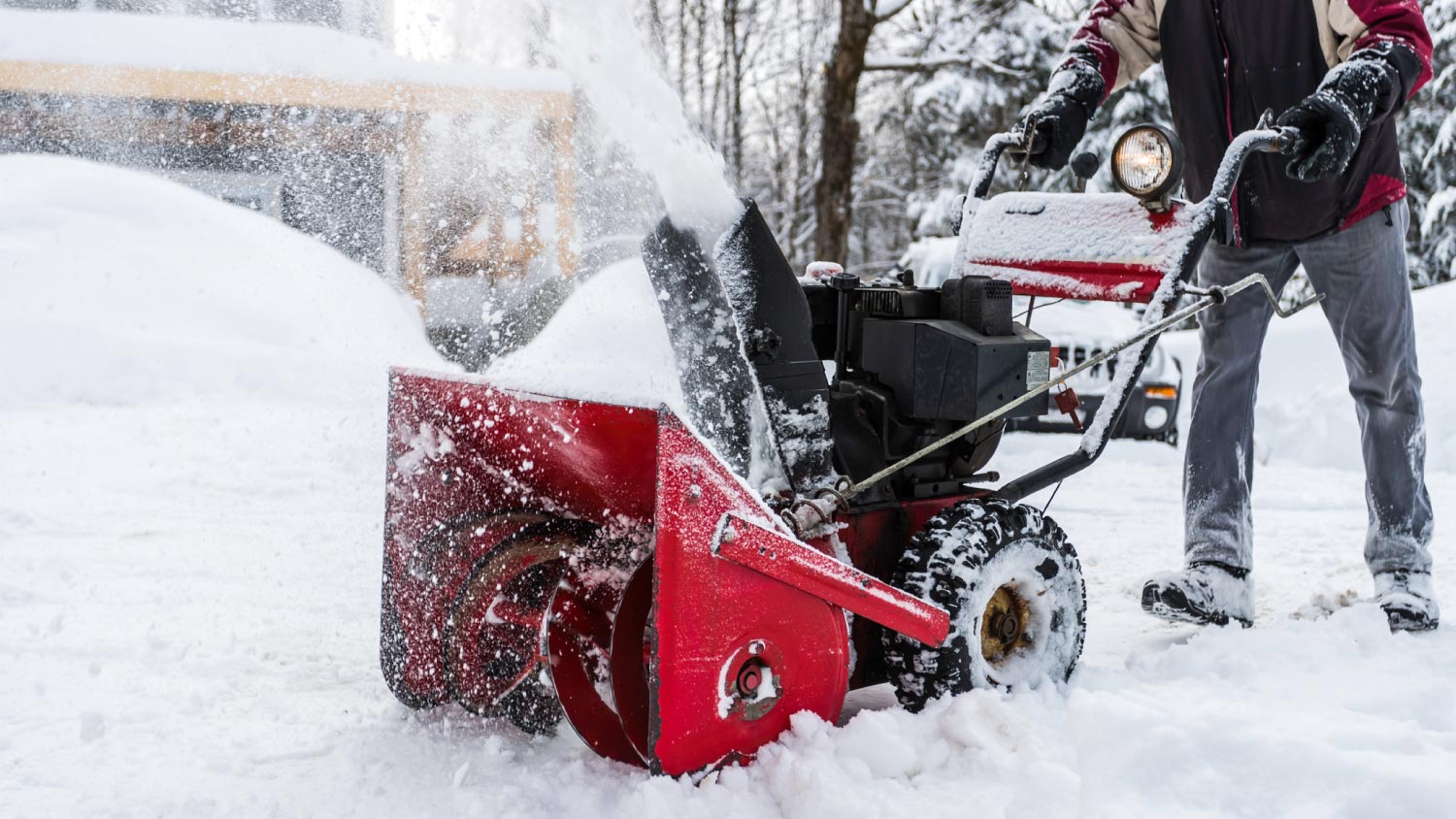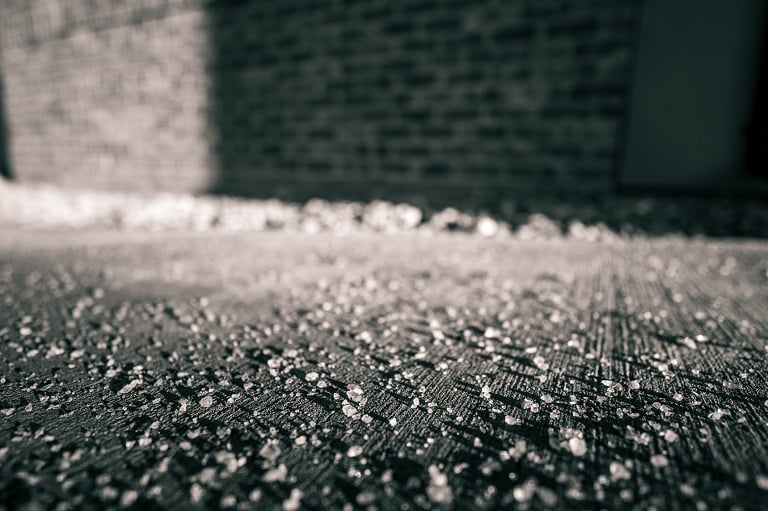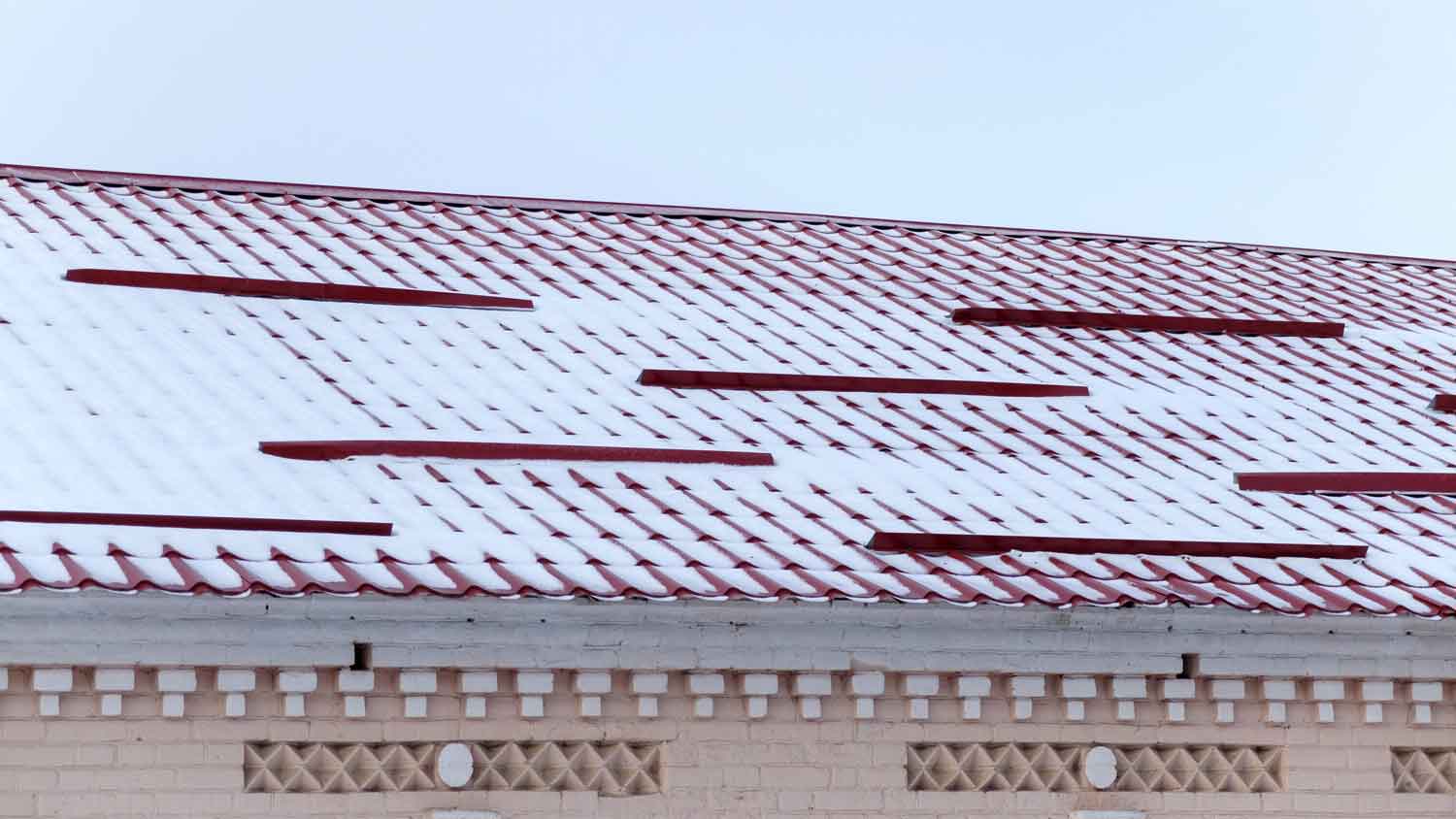
Get the latest snow removal cost estimates, including average prices, key cost factors, and tips to help homeowners budget for safe, efficient snow removal.
Take a slippery situation and make it safe and sound


Hire a snow removal pro to keep your driveway and walkway clear from dangerous ice throughout the winter season, as they tend to offer discounts for package deals.
They'll be able to recommend the perfect ice melt for your concrete driveway that won't damage your landscape.
Calcium chloride is a popular eco-friendly option because it doesn’t have toxic additives, but it can be expensive.
Budget-friendly options include potassium chloride and calcium magnesium acetate, otherwise known as CMA.
Natural options include alfalfa meal, coffee grounds, and kitty litter.
Keeping your driveway and walkways clear from ice and snow can be challenging. Some of the best ice melts for concrete driveways are calcium chloride, magnesium chloride, and potassium chloride, which is significantly more expensive than the other options.
Depending on your needs, these 10 options are the best—and safest—types of ice melt for concrete driveways that won’t cause divots or pockmarks.
Ice and snow melt products typically work by reducing the freezing temperatures of ice and snow and, true to its name, melting them away. Some ice melt works better on concrete, while other types might work better on asphalt.
One of the best ice melters for concrete is calcium chloride. This substance is considered one of the most popular choices to remove ice and snow from concrete driveways. It’s more expensive than salt but does offer advantages over salt for your concrete driveway.
Works quickly
Safer for the environment than many harsher chemical deicers
Less corrosive
Works in very low temperatures, down to -40 degrees Fahrenheit
Won’t harm your lawn or plants
A 50-pound bag is around $65
Magnesium chloride is consistently ranked as one of the best and safest ice melts for concrete on the market. Unlike some other ice melts, you can safely use magnesium chloride in heavily vegetated areas. It also has other benefits:
Non-corrosive
Works down to -13 degrees Fahrenheit
Works quickly
Magnesium chloride does cost more than calcium chloride, however. A 20-pound bucket is about $40.
Potassium chloride is another popular choice of ice melt for your concrete driveway and walkways. It has positive attributes, but it may not be your first choice if you need a fast-acting option.
Noticeably slower than other ice melt products
Works in low temps down to -12 degrees Fahrenheit
Less effective over a large amount of ice and snow
Non-corrosive
Friendly to animals and plant life
A 40-pound bag is about $35
Calcium magnesium acetate (CMA) prevents ice and snow particles from adhering to one another on concrete surfaces. It is made up of acetic acid, the main component of vinegar.
Often used as an additive to other snow melts to improve their safety
Safe for plants and animals
Works down to temperatures of around 20 degrees Fahrenheit
Usually come in small granules, making it easier to cover large areas
About $20 for a 10-pound bag
Urea is a common fertilizer. However, it also makes an effective snow-melt product because of the heat it produces. It is considered safe but has its drawbacks.
Works best at 25 degrees Fahrenheit and above
Not as environmentally safe as other choices
Not as fast-acting
Can be expensive. A 50-pound bucket is around $70

While there are a lot of ice- and snow-melt options to keep your driveway clear all winter long, some other choices might be better if you have small children or pets. Or maybe you’re concerned about the environment and would rather use “green” alternatives. Whatever the reason, these options work—possibly just not as well or as fast.
All are safe for concrete and will not cause pockmarks or divots on the surface of your concrete driveway. But a few might stain the surface, requiring power washing.
Like Urea, alfalfa meal is a popular fertilizer. It is also a good deicer for your concrete driveway that is safe for the environment and your pets. It has a grainy texture, which can also make your driveway more slip-resistant than some other types of ice melt.
Safe for pets, even if they lick their paws
Runoff from the driveway might help fertilize your plants
Must be stored in an airtight container as it can attract rodents or wildlife
Easy to find wherever fertilizer is sold
A 5-pound bag runs about $30
One great way to melt driveway ice without salt is to use a product that’s lying around in your pet supplies cabinet. You can use your cat’s kitty litter for another purpose—as an ice melt. Just sprinkle it on your concrete driveway, and it will melt ice just like salt. It won’t work as quickly, and maybe not as well as some other ice melts, but it is an inexpensive option for pet lovers.
Melts ice like salt
Won’t harm plants
Keeps smooth surfaces from becoming slick from the melting water
Litter will cling to shoes and is messy
A 38-pound box is around $40
You can also use coarsely ground coffee grounds as an ice melt on your concrete driveway. In fact, it is a very popular alternative to chemical deicers and can be nourishing to lawns and garden soils.
Will provide a bit of traction if coarsely ground
Dark color of the grounds absorbs heat and light, making them an effective ice melt
Extended use on your concrete driveway can cause staining
Safe for pets and children but can be messy
Expensive
Difficult to collect enough grounds to be effective on a large area
A bag of coffee grounds costs as low as $2
In many parts of Canada (and to some extent in the U.S.), beet juice has become a very popular option to melt ice and snow on city streets. Store-bought beet juice ice melt is made from a solution of beets and brine when mixed with salt. Not all solutions contain salt, and you can make your own. Keep in mind that beet juice alone (without salt) may not work as well.
Sticky, so very little runs off into your lawn
Leaves behind a light brown or red stain that you can wash off
White or golden beets won’t leave a stain
Contains sugar, which can attract ants and insects in the spring
Not as effective as other methods in a hard freeze
A 25-pound bucket can cost as much as $60
You can make your own, but it takes a lot of beets to cover the whole driveway
If you want an option that is fairly hands-off, you might consider heated snow-melting mats. You can place them on your driveway before the first snowfall. They are rated for long-term outdoor use and can stay in place throughout the winter season. Plus, you can interlock the pads to cover your entire driveway.
Environmentally safe, uses no chemicals
Helps prevent slips and falls
Affordable to operate; usually costs less than $2 per day
Requires a power unit to connect the system to an electrical outlet
Will melt approximately 2 inches of snow per hour
Expensive upfront. Each mat can cost $100 or more
If you’re not down to DIY or you’re still not sure which works for your particular situation, reach out to a local snow removal pro to learn more.
Rock salt is much different than ice melt but is inexpensive and easy to find at your local hardware store. It is also extremely popular for clearing snow and ice off of your driveway. But salt can harm the protective sealers and finishes that keep your concrete so beautiful. It can also be harmful to pets.
So, before you pick up that bag of rock salt and start sprinkling it all over your driveway, there are other—and better—choices that work just as well for keeping concrete areas safe and relatively ice- and snow-free.
From average costs to expert advice, get all the answers you need to get your job done.

Get the latest snow removal cost estimates, including average prices, key cost factors, and tips to help homeowners budget for safe, efficient snow removal.

Discover the cost to install snow guards. Learn about average prices, key cost factors, and tips to save on your snow guard installation project.

There are several ways to melt ice on driveways, including with and without salt. Read this tutorial on how to melt ice on driveways to get started.

If snow melts in your yard, but the grass is still covered in patches of white, you may have snow mold. Learn how to get rid of snow mold with this guide.

Snow and ice create a slippery hazard, so it’s important to address them. Learn the key differences between using sand vs. salt for snow.

Deciding between a gas snow blower vs electric? Weigh all of the pros and cons with this informative guide before you buy.